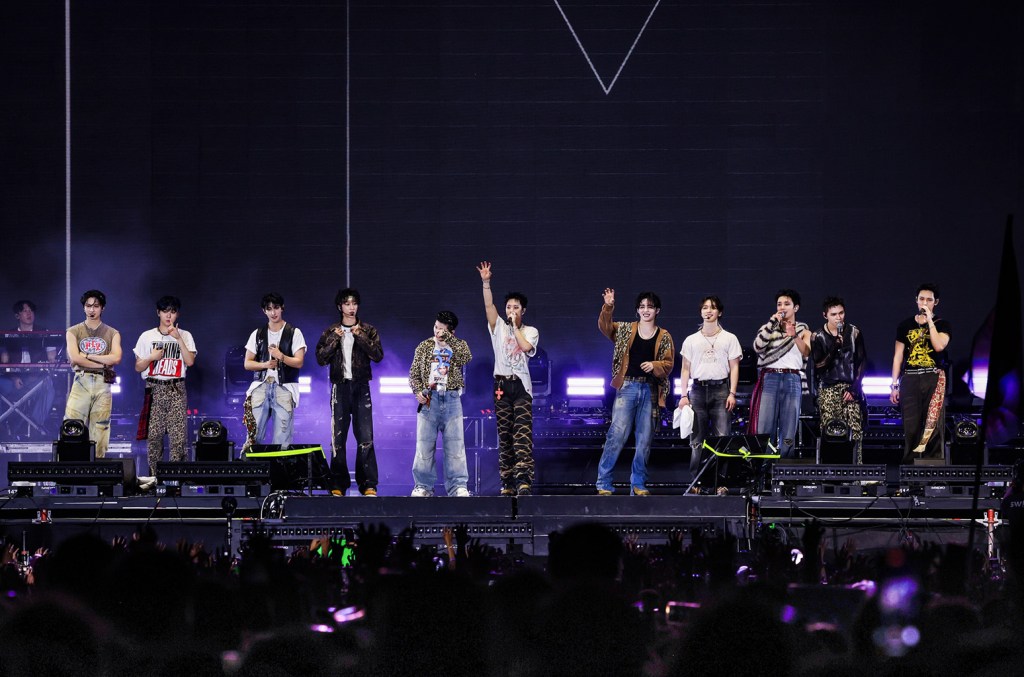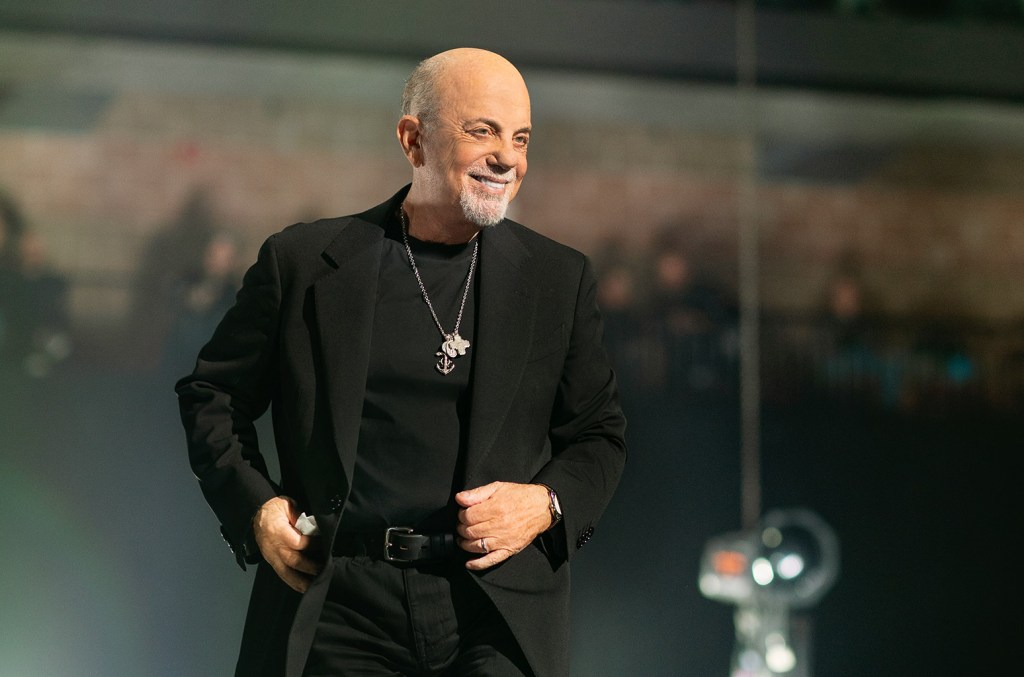Touring
Page: 15
Rezz is the latest artist to relocate a show from the Brooklyn Mirage, the New York venue that was meant to reopen earlier this month but remains closed amid ongoing permitting issues. On Wednesday (May 28), the producer announced on social media that her May 30 performance will now take place at SummerStage in Central […]
On Wednesday (May 28), Billboard revealed its midyear Boxscore charts, celebrating the top-grossing and best-selling artists, venues, and concert promoters around the world between Oct. 1, 2024, and March 31, 2025. Amid the pop, rock, R&B and Latin acts that blanket the Top Tours ranking, an unprecedented string of K-pop artists are in the mix, with five such acts among the all-genre top 50.
SEVENTEEN leads the pack, as it did for K-pop on midyear recaps for 2024 and 2023. But after grossing $30 million on the 2023 list, and $67.5 million for 2024, the group is No. 3 on the overall tally with $120.9 million and 842,000 tickets sold, according to figures reported to Billboard Boxscore. The group is sandwiched between Shakira at No. 2 ($130 million) and Eagles at No. 4 ($112.2 million).
SEVENTEEN is the highest-ranking Korean act ever on the all-genre midyear list, surpassing BTS’ No. 4 rank in 2022. BTS did manage a matching No. 3 rank on 2019’s year-end tally, but hadn’t played enough shows in the first half of that chart year to appear on the midyear chart.
Not only has K-pop’s top artist essentially doubled its midyear gross for the second consecutive year, but the bench is deepening. This year’s all-genre top 50 includes five K-pop acts, up from three in 2023 and 2024, and two in 2022. The threshold for K-pop’s top five is $25.1 million at the midyear point – this time last year, it was $3.1 million.
After SEVENTEEN, ATEEZ and J-Hope are next at Nos. 2-3 on Top Tours by Genre (K-pop), each with earnings of more than $28 million. The latter is the first K-pop soloist to make the midyear overall Top Tours chart, though he previously was included with his fellow BTS bandmates. ENHYPEN and TOMORROW X TOGETHER round out the list, also within a couple percentage points of one another above the $25 million mark.
These four groups and one soloist made their millions while proving the international strength of Korean artists. During the six-month tracking period, they toured arenas and stadiums throughout Asia (SEVENTEEN, J-Hope, ENHYPEN and TOMORROW X TOGETHER), Europe (ATEEZ and TOMORROW X TOGETHER), Mexico (J-Hope) and the U.S. (SEVENTEEN and J-Hope).
Altogether, K-pop acts on the midyear Top Tours chart brought in a collective $228 million and sold 1.6 million tickets from 78 shows. That marks a 79% increase over the genre’s 2024 showing, which itself was a 93% jump from 2023. In just two years, K-pop has more than tripled its presence on the midyear chart.
Scroll down for details on the top five K-pop acts on Billboard’s midyear Boxscore report. The midyear tracking period covers all reported shows, worldwide, between Oct. 1, 2024, and March 31, 2025.
On Wednesday (May 28), Billboard revealed its midyear Boxscore report, tracking the top touring artists, concert venues and promoters around the world. From October 1, 2024, to March 31, 2025, the midyear recap focuses on the biggest tours from the end of 2024 and beginning of 2025, before global stadium tours and music festivals take over the summer.
The animated graphic below shows how the top 10 tours have shaped and shifted over this six-month period.
The immediate leader was Paul McCartney. The legendary Beatle played a sold-out stadium show in Montevideo, Uruguay on the first day of the tracking period, bringing in $4.5 million from 37,573 tickets sold. Later that week, he had two dates at Estadio River Plate in Buenos Aires, adding $20.6 million and 128,000 tickets to his totals.
But by October 9, Bruno Mars stole McCartney’s thunder. Four shows deep into a six-night run at Sao Paulo’s Estadio do Morumbi, Mars’ $28.2 million surpassed McCartney’s $25.1 million. These early shows, plus Luis Miguel’s seven nights in Mexico City and Aventura’s stadium shows in Argentina and Peru, helped establish Latin America as live music’s center of gravity for the early days of the 2025 Boxscore tracking period.
Before the end of October, estimates for Taylor Swift’s The Eras Tour overtook Mars, McCartney and everyone else, as she began the final leg of her record-breaking two-year trek. While overall tour gross and attendance was reported by The New York Times, show-by-show data has still not been reported to Billboard Boxscore. Therefore, Swift remains absent from official midyear charts and her specific grosses in this time period have not been officially submitted.
Swift stays on top throughout the rest of the video, ultimately grossing an estimated $250 million in the tour’s final months in the U.S. and Canada. But the top 10 continued to fluctuate with November and December shows from Aventura, P!nk and Usher.
After bouncing around the top five in the late months of 2024, Coldplay asserted itself under Swift in January. The band played shows in the United Arab Emirates and India, breaking stadium attendance records for the 21st century with its two nights in Ahmedabad, India (more than 111,000 tickets each show).
Late-in-the-game moves come from K-pop boy band SEVENTEEN and Latin pop icon Shakira. Both artists grossed more than $100 million by the end of March, with Shakira banking her entire $130 million in just the last two months of the tracking period.
Coldplay, Shakira, Eagles, and Usher have all had reported shows in April and May that set them up for bigger totals by year-end. And the last few weeks have seen the kick-off for major tours by Beyoncé, Lady Gaga, Kendrick Lamar & SZA and Post Malone. By the end of 2025, this top 10 will likely get shaken up several times over.
Most people wouldn’t expect to see pillows passed around a Dead & Company concert.
But for Bernie Cahill of Activist Artists Management — the firm that manages Bobby Weir, a founding member of the Grateful Dead and frontman of Dead & Company (which Cahill co-manages with Irving Azoff and Steve Moir) — the decorative pillows, handed out to fans with floor tickets during the band’s nightly performance of “Drums/Space” at its Sphere residency, serve an important purpose. Those on the floor are encouraged to lie down and gaze up at the cutting-edge venue’s towering screen, which during the instrumental segment often displays imagery of the cosmos; at other points during the band’s Dead Forever shows, audiences take in visuals from the San Francisco Bay Area to psychedelic animations.
Thanks to its massive video screen, its booking of superstar acts and its aggressively high ticket prices, Las Vegas’ Sphere — where Dead & Company alone grossed $21.6 million from six concerts in March, when it resumed shows there following a successful run last year — is again the world’s top-grossing building, according to figures reported to Billboard Boxscore. It surpasses the top stadium (Mexico City’s Estadio GNP Seguros) and two iconic New York venues (Madison Square Garden and Radio City Music Hall) with a $165.3 million haul at midyear, which spans from Oct. 1, 2024, to March 31, 2025.
Sphere’s economic power isn’t in its show count — at midyear, the venue has hosted only 42 dates, including other residencies by the Eagles and dance artist Anyma — but in its average ticket price, which at $238 is roughly double those of Madison Square Garden ($133) or London’s O2 Arena ($105). While much of the music industry debates rising ticket prices, Sphere has shown there’s a vibrant market ready to pay a premium for special experiences delivered by top talent.
A DOWNWARD TREND: This year’s midyear charts are down significantly compared with 2024: Last year, the top 10 tours at this time had a combined gross of $1.4 billion, while in 2025, the top 10 outings have grossed a combined $1 billion, a drop of more than 28%. Among the top 50 tours, the combined gross disparity was less stark but still notable, going from $3.2 billion in 2024 to $2.5 billion in 2025, a drop of about 21%.
But this shift doesn’t necessarily signify weakness in the market. The main reason was show count: There have been fewer concerts in 2025 at the midyear point than there were in 2024. In 2024, the top 10 tours at midyear reported a combined 442 total shows for the period, compared with 245 in 2025, a 45% decline. For the top 50, the 1,425 shows reported in 2024 fell to 1,159 in 2025, a drop of 18.7%. On Billboard’s Top Promoters chart, Live Nation’s grosses were down to $2.2 billion in 2025 from $2.8 billion in 2024. But because shows are booked months, or sometimes over a year, in advance, changes in the number of total shows don’t reveal much about consumer spending or demand in early 2025.
The decline partially stems from timing. During a recent earnings call, Live Nation president/CEO Michael Rapino noted that more artists are waiting until the second and third quarters to launch their tours — and with more acts playing stadiums in 2025, more major tours are on the road in the summer, when the weather is better. The 2025 show count should increase in the next six months, which historically covers the busiest part of the year, especially in North America.
Importantly, last year’s touring numbers at midyear were unusually high thanks to U2’s venue-opening Sphere residency, which grossed $231.6 million from 38 shows during that time. That tracking period also included dozens of concerts from three major tours (Madonna, P!nk and Luis Miguel) that led to a high show count.
CHART STATS: Three acts in the 2025 midyear top 10 — Coldplay, P!nk and Eagles — also appeared in last year’s midyear top 10. And three more among the top 10 — Paul McCartney, Bruno Mars and SEVENTEEN — ranked among the top 20 at midyear in 2024. But there are some notable differences in the music genres atop the chart.
After three Latin tours reached the top 10 at midyear in 2024, only Shakira has done so in 2025. And after Travis Scott ranked No. 9 at midyear in 2024, no hip-hop artists cracked the top 10 in 2025. The highest-ranking hip-hop tour at midyear is Tyler, The Creator, who is No. 16 with $65.3 million grossed.
When it comes to ticket prices, Eagles at Sphere had the highest average price among the top 10 tours of $285 per ticket, followed by Usher, who charged an average of $179, and P!nk, whose tickets averaged $174.
The cheapest tickets among the top 10 tours were for Coldplay ($109), Mars ($118) and McCartney ($129). On average, the ticket price of the top 50 tours was $130, down 10% from 2024. On the Top Tours chart, 10 acts had an average ticket price that was under $100: Aventura ($99), Sebastian Maniscalco ($98), André Rieu ($94), Deftones ($88), Iron Maiden ($85), Trans-Siberian Orchestra ($84), Nick Cave and The Bad Seeds ($84), Cody Johnson ($77), Feid ($77) and Strait ($49).
THE TOP 10: Keep scrolling for details on the top 10 touring artists of Billboard’s midyear Boxscore period, tracking all shows worldwide from Oct. 1, 2024, to March 31, 2025.
Justin Timberlake
Image Credit: Kevin Mazur/Getty Images
Private equity firm Providence Equity Partners has made a majority investment in logistics company GCL, the companies announced Wednesday (May 21). Previous majority owner ATL Partners will retain a minority stake in GCL. Terms of the deal were not announced, but The Wall Street Journal reported the investment values GCL at more than $1 billion. […]
Steve Earle has a number of events he can point to in his life to mark 50th anniversaries, but he’s clear about what’s sending him on his Fifty Years of Songs and Stories tour that kicks off May 25 in Decatur, Ala.
“It’s the 50th anniversary of me signing my first publishing contract – me officially in the music business,” Earle tells Billboard. That was in Nashville when, after a good six years of tooling around in Texas – including playing in his songwriting hero Townes Van Zandt’s band – Earle was working by day and playing at night, including as part of Guy Clark’s group. The song publishing company Sunbury-Dunbar made him a staff writer, though Earle would subsequently head back to Texas and then return to Nashville, where he became an artist in his own right with the 1982 EP Pink & Black; his career really took off with 1986’s Guitar Town, which hit No. 1 on Billboard’s Top Country Albums chart.
Earle, 70, has been going ever since, with hits, misses and a brief incarceration during the mid-‘90s for cocaine and weapons possession. Others – including Joan Baez, Travis Tritt, Robert Earl Keen and Stacy Dean Campbell – have recorded his songs, but Earle has remained determinedly and defiantly his own man, winning three Grammy Awards along the way and delving into other projects such as production (for Baez and Lucinda Williams), acting (HBO’s Treme and The Wire, off-Broadway’s Samara ) and theater (the Drama Desk Award-nominated Coal Country). His social and political activism led to the National Coalition to Abolish the Death Penalty’s shining star of abolition award in 2010, and in 2020 he was inducted into the Nashville Songwriters Hall of Fame.
Clearly, there will be a lot of stories to go with the songs when Earle hits the road (his shows will be mostly solo, though he’s playing a few dates with the band Reckless Kelly). “It’s not strictly chronological; that’s the backbone of it, but some songs I play are based on memories, so something I wrote a little later may pop up earlier in the show,” Earle explains. “It’s sort of built around telling stories; I try not to talk too much, but I’m good at that thing. I started in coffee houses, so that’s basically the deal.”
Earle is hoping to finish work on his next musical, a stage adaptation of the hit 1983 film Tender Mercies, while he’s out on the road. “I want to finish at least three songs so I have a draft,” he says. “These things take years to (complete). I’m just trying to live long enough to get the f–kin’ thing up.” He also appears on Willie Nile’s upcoming new album The Great Yellow Light and has recorded a “cosmic country” song, “Dead or Gone to Dallas,” for a split single he’s doing with Reckless Kelly. “It would work on Guitar Town,” Earle notes. “I was talking to Miranda Lambert; my family’s from the same part of Texas as she’s from, and she asked me if I ever went up there. I said, ‘Everyone I know is dead or gone to Dallas.’ She said, ‘Don’t write that with anybody!’” Earle has also finished “a big chunk of” a memoir as well as “a little bit of” a novel.
“I really mean to finish them before I die,” he says, noting that after turning 70 “you think about it even more. You wouldn’t think one number would make a difference more than any other number. But my father was only 74 when he died and my grandfather only lived to be 63. One uncle was 80 but the other died younger than my dad. And you get to be a certain age and your friends start dying. On my radio show [Hard Core Troubadour on SiriusXM’s Outlaw Channel] I used to do tributes occasionally; now it’s more often than I’d like.”
As he gets ready to hit the road with his Fifty Years of Songs and Stories Tour, we thought we’d get Earle to tell us the stories behind five key songs in his career. Check out Earle’s tour dates here.
“L.A. Freeway” (Guy Clark, 1970; covered by Steve Earle in 2019)
Billy Joel is canceling all of his upcoming shows due to a health issue affecting his ability to perform, the musician announced Friday (May 23).
In a statement shared to his social media accounts, he shared that the decision comes following a “recent diagnosis” of normal pressure hydrocephalus. “This condition has been exacerbated by recent concert performances, leading to problems with hearing, vision and balance,” his statement reads. “Under his doctor’s instructions, Billy is undergoing specific physical therapy and has been advised to refrain from performing during this recovery period. Billy is thankful for the excellent care he is receiving and is fully committed to prioritizing his health.”
“He is grateful for the support from fans during this time and looks forward to the day when he can once again take the stage,” the announcement continues, concluding with a message directly from Joel: “I’m sincerely sorry to disappoint our audience, and thank you for understanding.”
Fans with tickets to any of the “Piano Man” singer’s scheduled shows will receive automatic refunds to their original payment method.
Trending on Billboard
According to Cleveland Clinic, normal pressure hydrocephalus is a condition that occurs when cerebrospinal fluid builds up inside the skull, pressing on the brain. It can affect “several brain-related abilities, including thinking and concentrating, memory, movement and more,” with treatment involving implanting a shunt to drain the excess fluid.
Joel had several shows planned throughout the summer and fall of this year, as well as a few performances scheduled for the first half of 2026. His canceled appearances include his joint dates with Sting, Rod Stewart and Stevie Nicks, as well as his solo gigs.
The Rock & Roll Hall of Famer previously delayed several of those tour dates by four months after revealing that he had recently undergone surgery. Joel did not disclose his medical condition at that time.
“While I regret postponing any shows, my health must come first,” he said in a statement in March. “I look forward to getting back on stage and sharing the joy of live music with our amazing fans. Thank you for your understanding.”
The five-time Grammy winner had been poised to make history on his trek, as his now-canceled shows at Yankee Stadium in the Bronx, N.Y.; Metlife Stadium in East Rutherford, N.J.; and Citi Field in Queens, N.Y., would have made him the first artist to play all three NYC-area stadiums in one summer. “Each [venue] holds personal significance to me,” Joel had told Billboard of the feat in early February. “There’s nothing like the energy of the crowds in New York.”
Joel’s health update comes shortly after it was announced that his upcoming two-part documentary, Billy Joel: And So It Goes, will premiere at the Tribeca Film Festival in June. Later in the summer, the project will air on HBO.
See Joel’s post below.
The time is counting down until BLACKPINK is finally back in your area, something the girl group members got BLINKs hyped up for with an intense new teaser for its Deadline World Tour.
In a 30-second promotional for the trek posted Friday (May 23), a strong, metallic synth drone plays as three-dimensional letters rise from a pool of pink glitter. With one punctuated drum beat, all of the sparkles fall away to reveal the word “DEADLINE.”
The teaser comes about two months ahead of the highly anticipated tour’s kickoff at Goyang Stadium in Goyang, South Korea, on July 5. The Deadline trek will mark members JENNIE, ROSÉ, JISOO and LISA’s first time hitting the road since their 2022-2023 Born Pink World Tour, which grossed $148.3 million with 703,000 tickets sold across 29 shows, earning BLACKPINK a spot on Billboard‘s 2023 Top Tours chart.
Trending on Billboard
Following two performances in Goyang, the girl group will play dates in stadiums across Los Angeles, Chicago, Toronto, New York, Paris, Milan, Barcelona and London before closing out in 2026 in Tokyo, Japan, on Jan. 16-18.
BLACKPINK hasn’t dropped an album since 2022’s Born Pink — which debuted at No. 1 on the Billboard 200 — but ahead of the new tour, the members have been teasing new music. “Actually, we were in the studio a few days ago,” LISA told Variety earlier in May. “We’re all so super excited to get back together and go on tour. We really miss the BLINKs. We can’t wait to see them.”
The reunion will follow about two years of the foursome working on solo projects, with the White Lotus star, ROSÉ and JENNIE all dropping debut albums, and JISOO sharing a solo EP in addition to starring in acting projects, during the group’s time apart.
Watch the new Deadline World Tour teaser below.
Following an extended delay in the reopening of New York club Brooklyn Mirage, Josh Wyatt will no longer serve as CEO of the club’s parent company, Avant Gardner, sources close to the situation confirm to Billboard.
Gary Richards, Avant Gardner’s non-executive chairman of the board, will manage day-to-day operations for Avant Gardner in the interim, effective immediately.
The leadership swap follows a turbulent few weeks for Avant Gardner, the company and events complex, and its flagship venue, Brooklyn Mirage. After an extensive remodel and much fanfare, the club was set to open on May 1 with a two-night run from hard techno producer Sara Landry. Those shows were both canceled by the club hours before they were set to begin, after building inspectors declined to grant the recently renovated facility a permit to open.
All subsequent shows at the venue have been canceled or postponed, with the club making a statement on social media earlier this week that read, “We’re sad to announce that our Brooklyn Mirage shows through Memorial Day weekend have been moved to dates in July and August.”
Trending on Billboard
As reported by Billboard earlier this month, sources monitoring the situation said Mirage officials were given a list of fixes that needed to be completed for the club to open following an extensive renovation at the venue complex Avant Garner, which includes the 80,000-square-foot, 6,000-capacity Williamsburg nightclub. Widely recognized as one of the top stops in New York for electronic and dance acts, the Mirage had operated for years with the support of New York Mayor Eric Adams, whose office has intervened on Avant Gardner’s behalf as part of an ongoing legal fight with New York’s State Liquor Authority.
The former CEO of NeueHouse, Wyatt was hired as Avant Gardner CEO last October. Richards, meanwhile, is a longtime dance industry figure who founded HARD Events in Los Angeles in 2007 (the company was acquired by Live Nation in 2012). He is also the former North American president of Live Style, the founder of the All My Friends and Friendship festivals, and has been a board member at Avant Gardner since 2024.
A representative for Avant Gardner did not immediately respond to Billboard’s request for comment.
German concert promoter CTS Eventim’s revenue grew 22.0% to 498.6 million euros ($525 million), nearly doubling its 11.6% growth rate in the prior-year period. Adjusted earnings before interest, taxes, depreciation and amortization (EDITDA) rose just 8.9% to 100.3 million euros ($106 million). Adjusted EBITDA margin of 20.1% was more than two percentage points lower than […]

 State Champ Radio
State Champ Radio 










